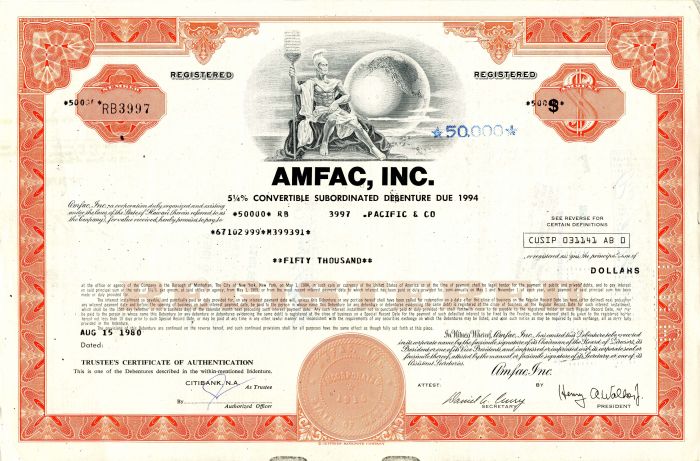AMFAC, Inc. formly known as American Factors - $50,000 Bond
Inv# GB5597 Bond
$50,000 5 1/4% Bond printed by Jeffries Banknote Company.
Amfac, Inc., formerly known as American Factors and originally H. Hackfeld and Company, was a land development company in Hawaii. Founded in 1849 as a retail and sugar business, it was considered one of the so-called Big Five companies in the Territory of Hawaii. At its peak, it owned 60,000 acres (24,000 ha) of land, and was a dominant sugar company in Hawaii as well the founder of one of its best known department stores, Liberty House. It now owns 5,000 acres (2,000 ha) of land in Kaanapali on the island of Maui. Since 2005 it is known as Kaanapali Land, LLC (OTC Pink: KANP).
German immigrant Heinrich Hackfeld and his brother-in-law J. C. Pflueger founded a dry goods store called H. Hackfeld and Company in 1849 in Honolulu. Hackfeld later became the business agent for Kōloa Plantation on the island of Kauaʻi. Paul Isenberg (1837–1903) became a partner in 1881.
During World War I, Pioneer Mill, DCCA #207, was seized by the U.S. government Alien Property Custodian. It was later sold to a consortium of Hawaii businessmen in 1918, who changed the name to "American Factors". In 1966, the name was further shortened to "Amfac". Henry Alexander Walker became president in 1933. The family estate in Nuuanu Valley known as the H. Alexander Walker Residence, was developed into a showcase orchid garden.
From 1968 to 1972, under president Henry Alexander Walker Jr., Amfac acquired 42 different companies. These included the Fred Harvey Company, which had grown to fame operating Harvey House restaurants along railroad lines starting in 1876.
As of the 1970s, Amfac ran a variety of hospitality, retail, financial and other businesses in California, among other states. California was its second state after Hawaii. It operated:
- 13 Joseph Magnin specialty department stores across Southern California
- the restaurants at the Los Angeles Music Center
- the Airport Marina Hotel, operated by Fred Harvey
- Fred Harvey's Furnace Creek Inn and Ranch in Death Valley (now the Inn at Death Valley)
- The Victor Hugo Inn in Laguna Beach
- The Tejon Ranch House in Lebec
- The Ranch House Inn in Valencia
- Fred Harvey-operated food and beverage and in-flight dining services at Ontario Airport
- Amfac Mortgage providing real estate financing services from six offices
- Amfac Properties and Amfac Communities, offering real estate development and management services
- Amfac Drug Supply, distributing pharmaceuticals to hospitals and pharmacies from six branches
- Amfac Electric Supply, distributing materials to contractors and builders from a dozen branches
Ronald L. Sloan was removed as president November 20, 1987, and replaced by Richard L. Griffith (Walker was still chairman of the board). The company announced it was selling its non-Hawaii business units. Amfac was bought by Chicago-based JMB Realty in 1988 for US$920 million.
As the sugar industry in Hawaii declined after statehood, so did the fortunes of Amfac. Amfac's assets were gradually sold off or closed. Oahu Sugar in Waipahu was closed in 1994. Liberty House went into bankruptcy in 1998 (it was later acquired by Federated Department Stores and now carries the Macy's brand name). The Pioneer Mill in Lahaina closed in 1999, and the Kekaha Sugar Mill and Lihue Plantation closed in 2000. Amfac Hawaii went into Chapter 11 bankruptcy in 2002. Amfac Hotels & Resorts was retained by JMB and was renamed Xanterra Parks and Resorts. Amfac Hawaii was reorganized as Kaanapali Land, LLC and the bankruptcy closed in 2005. Some of the former plantation land uphill from the resort has been subdivided into a development called Kāʻanapali Coffee Farms.
A bond is a document of title for a loan. Bonds are issued, not only by businesses, but also by national, state or city governments, or other public bodies, or sometimes by individuals. Bonds are a loan to the company or other body. They are normally repayable within a stated period of time. Bonds earn interest at a fixed rate, which must usually be paid by the undertaking regardless of its financial results. A bondholder is a creditor of the undertaking.









Ebay ID: labarre_galleries